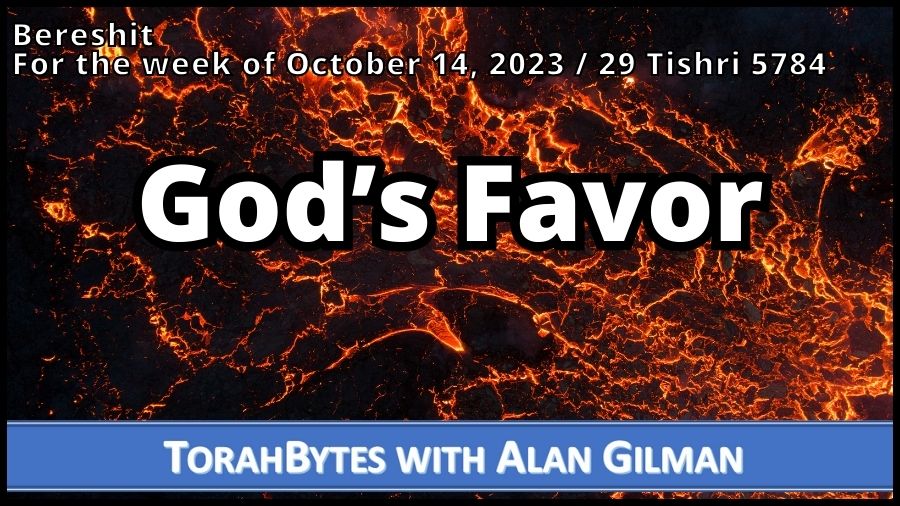For the week of October 14, 2023 / 29 Tishri 5784

Bereshit
Torah: Bereshit/Genesis 1:1 – 6:8
Haftarah: 1 Shmuel/Samuel 20:18-42
And the LORD regretted that he had made man on the earth, and it grieved him to his heart. So the LORD said, “I will blot out man whom I have created from the face of the land, man and animals and creeping things and birds of the heavens, for I am sorry that I have made them.” But Noah found favor in the eyes of the LORD. (Bereshit/Genesis 6:6-8)
I write this on the fifth day since, what one writer has called, “The Simchat Torah Pogram,” when Hamas terrorists invaded the south of Israel, indiscriminately murdering, raping, and kidnapping over 1200 Israelis and others. Simchat Torah is a special celebration at the end of the biblical feast of Sukkot (English: Tabernacles/Booths) to mark the end and beginning of the annual Torah reading cycle. Torah scrolls are held high and danced with inside and outside synagogues all over the world. Such a celebration seems inappropriate on such a day. Yet, it is the Torah as the foundation of the whole Bible that provides us the hope and direction we need to not only get through these terrible days but emerge victorious in time.
As we return to the first parsha (Torah reading portion) of the year, it is always a challenge to choose what to address, since there is so much to explore here. It seemed fitting to look at a time that was so bad that God himself regretted that he made human beings. I wonder how many times since then he has felt this way. What encourages me, however, is that despite the harsh judgment that he brought upon human evil in Noah’s day, he didn’t completely give up on his creation project. God’s commitment to his creation has sustained us until this day.
Note that it was not just general concern for creation that prevented him from destroying the planet. While he was just about to give up on human beings altogether, his plan for the earth included preserving people, which he did through Noah and his family. Also note that God assigned the task of preserving the people and the air-breathing animals to people. There’s so much about life that we imagine God could or should do on his own. Yet, in keeping with the mandate assigned to our first parents, God chooses to work through us. The story of Noah is a key example of how throughout history, human beings are both the problem and the solution of life on Planet Earth.
In the midst of impending doom, we read, “Noah found favor in the eyes of the LORD”(Bereshit/Genesis 6:8). This is the first occurrence of the Hebrew word, “khen,” which appears almost seventy times in the Hebrew Scriptures and is most often translated as “favor” or “grace.” Readers of the New Covenant Scriptures rightly regard the Greek equivalent “kharis” (English: again “grace”) as a central aspect of a genuine life of faith. Grace is a driving force behind a biblical understanding of salvation.
God’s grace and favor are unmerited. It’s not something we can achieve. Yet, there is a lot more to grace and favor than God’s acceptance and forgiveness. It’s more than a status statement. It’s a dynamic of relationship between God and the person he favors.
When God favors someone, his presence and power is with them. God’s favor is the dynamic that equipped Noah with everything he needed to know and the capability to fulfill this great rescue operation. God had rejected the rest of mankind. They were doomed. But God’s favorable posture toward Noah set him apart to make all the difference in his day.
We read in the New Covenant Writings:
For you have been delivered by grace through trusting, and even this is not your accomplishment but God’s gift. You were not delivered by your own actions; therefore no one should boast. For we are of God’s making, created in union with the Messiah Yeshua for a life of good actions already prepared by God for us to do. (Ephesian 2:8-10; Complete Jewish Bible)
Being saved by grace through faith (or trusting) in Yeshua the Messiah is more than a position or status, it is being equipped to display godliness in an ungodly world. This is especially important in difficult times. When everything around us seems to be going down the drain, those of us who know God’s favor are to reflect the goodness and power of God in all the ways he calls us to.
That probably won’t be as dramatic and complex as building an ark, but there are a lot more of us today under God’s favor than in Noah’s day. Let us not be overwhelmed by the rise of evil. Instead let us be attentive to God, doing whatever he calls us to do, be it big or small. There’s no telling how God’s favor may express itself through us, if we simply trust him.
Scriptures taken from the English Standard Version unless otherwise indicated